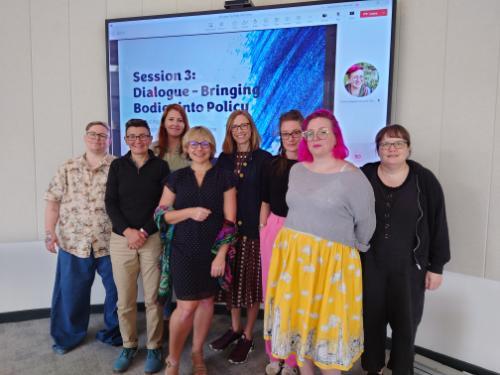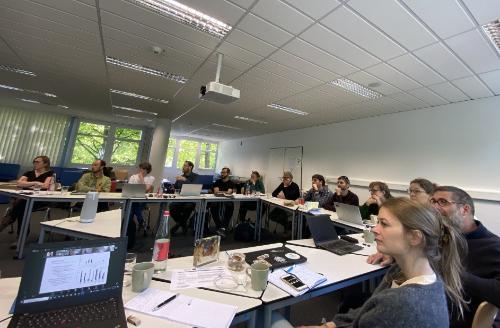AberCollab

Collaborations can strengthen research outcomes, foster robust knowledge exchange and produce impactful results.
AberCollab programme 2025-26:
The AberCollab funding and training programme created is part of Aberystwyth University’s 2023-2028 Innovation and Knowledge Exchange Strategy.
AberCollab aims to help researchers build and strengthen collaborations and share knowledge effectively to support innovation and impact. These collaborations can occur at all stages of the research process, including idea generation, emerging and active research, research programme expansion (scaling up), and research uptake (knowledge exchange and impact).
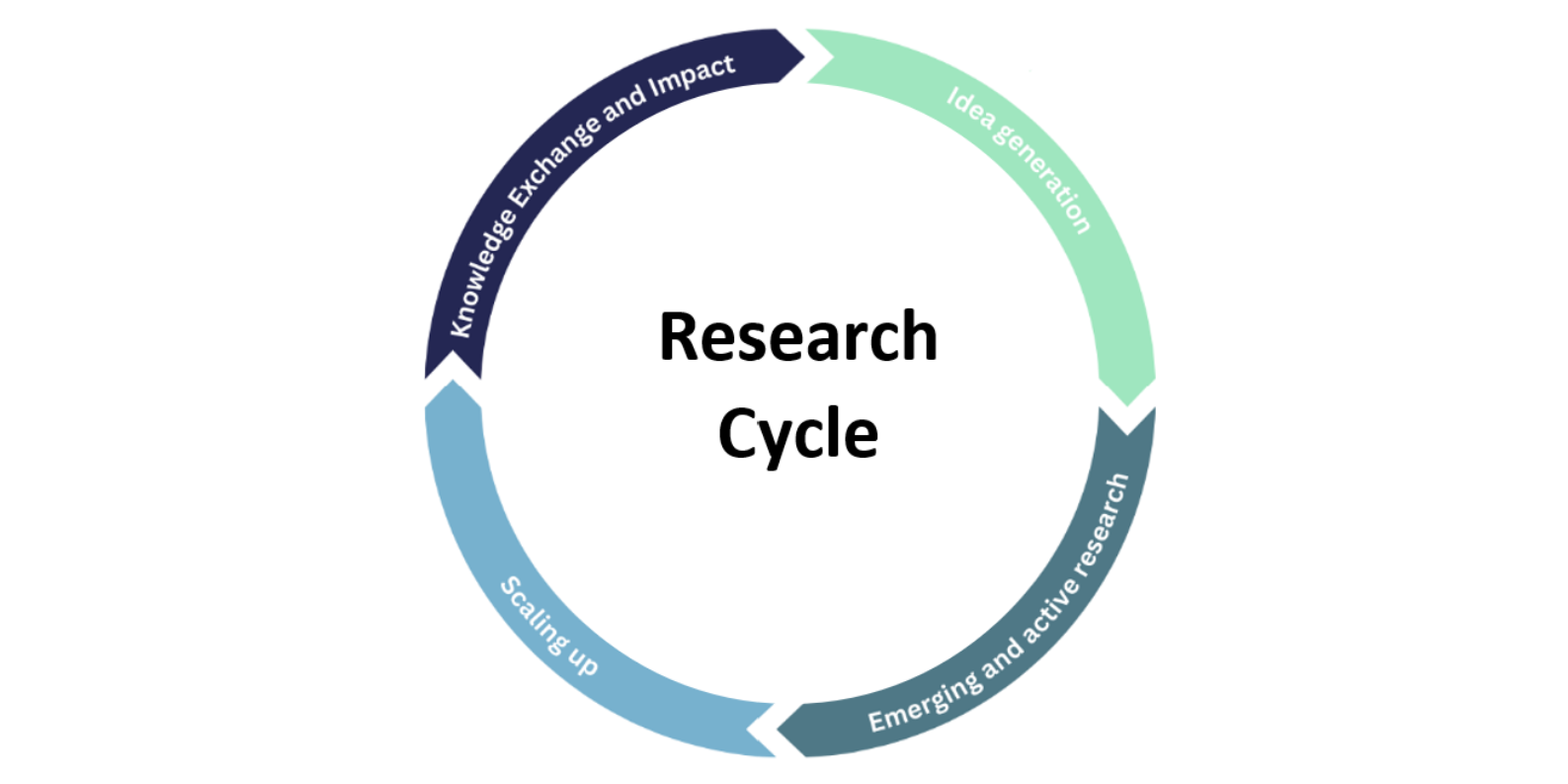
Financial details and eligibility
AberCollab will provide training and financial support of up to £3,000 for collaborative workshops and networking events intended to facilitate intellectual and creative collaboration between AU researchers and external partners. To optimize these opportunities, AberCollab awardees will also receive additional coaching by the Dialogue Centre.
The programme is funded by Medr through the Research Wales Innovation Strategy.
The programme includes:
- £3,000 to support a collaboration workshop or event.
- 1 day in-person training workshop on 5 November 2025.
- Event support.
- A halfway check-in event on 25 February 2026.
- A wrap-up lunch on 8 July 2026 with fellow awardees, hosted by the Dialogue Centre.
How to apply
Apply by 17 October 2025 (4pm).
Complete and submit the AberCollab Application Form.
Find out more
If there are any queries or if you wish to discuss potential ideas for a workshop or an event, please email resstaff@aber.ac.uk.
AberCollab 2024-25
AberCollab Report 2024-25
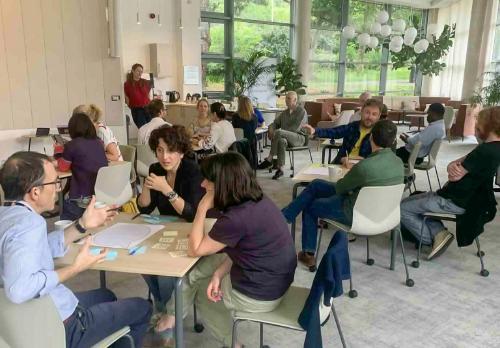
An innovative programme to foster collaboration and knowledge exchange between academics and external partners has brought together more than 200 individuals across seventeen separate research projects.
Funded through Medr’s Research Wales Innovation Fund, the 2024-25 AberCollab progamme supported projects ranging from town centre regeneration to developing natural pigment dye from mushrooms, empowering marginalised writers and safeguarding our waterways from a damaging invasive species of crab.
The programme offers small grants of up to £3,000 towards running a workshop, event or activity which facilitates collaboration between the University’s researchers and external partners and moves the research process forward.
Researchers are also given training in research collaboration building to develop their skills in designing and leading effective interactive sessions.
Susan Ferguson, a Research Impact and Knowledge Officer in the Department of Research, Business and Innovation, said:
“We want our research to help change lives for the better, grow knowledge, build communities and strengthen Wales and the wider world. By fostering deeper collaborations between researchers and external stakeholders, we can draw on shared experience and expertise to co-create solutions to real-world challenges.
“This is the second year we have run our AberCollab programme and once again, we were impressed not only by the range and the reach of the research projects but also by the professionalism and commitment of everyone involved. The seed funding awarded to academics acts as a springboard for larger research projects which engage external collaborators, and we look forward to seeing further developments and longer-term impact.”
Across the seventeen projects awarded funding in 2024-25, external partners were drawn from academic institutions as well as government, local authorities, the third sector, industry and diverse communities in Wales as well as Europe.
The projects were led by academics at different phases in the research cycle - from those in the scoping phase and those actively doing research to later phase research projects seeking to expand their potential for impact. They included:
- forging connections between researchers in Aberystwyth and Europe who are working on methods of managing the increasing population of non-native Chinese mitten crabs (Dr Joe Ironside, Department of Life Sciences)
- widening participation in literary festivals, ensuring a platform for marginalised voices, attracting more diverse audiences and making venues fully accessible (Dr Jaqueline Yallop, Department of English and Creative Writing).
- developing ways of replacing synthetic dyes with eco-friendly, non-toxic alternatives produced from agricultural by-products such as natural pigments from mushroom cultivation (Dr Amanda Lloyd, Department of Life Sciences)
- using LegoÒ as an accessible and inclusive method for bringing particpants together and facilitating discussions to identify opportunities and challenges for involving citizens in decision-making (Dr Anwen Elias, Department of International Politics)
- exploring the devolution of broadcasting policy powers to the nations with researchers from Ulster, Glasgow, London and Aberystwyth as well as representatives from the creative industries in Wales, Welsh-language campaign groups, communications’ regulator Ofcom and Welsh Government (Professor Jamie Medhurst, Department of Theatre, Film and Television Studies)
- examining new models of influencing, informing and co-creating climate policy through a series of roundtable discussions with local farmers, land use scientists and policymakers (Dr Hannah Hughes, Department of International Politics; Professor Mariecia Fraser, IBERS)
- exploring how creative interventions were used in the past to support mental health recovery and survival, and how this knowledge could be used to build current and future practice (Dr Elizabeth Gagen, Department of Geography and Earth Sciences)
- using zine making techniques to creatively analyse and evaluate the challenges facing economic regeneration and community development activities in Aberystwyth and Holywell in Wales and Mürzzuschlag in Austria (Dr Lyndon Murphy, Aberystwyth Business School)
- bringing researchers working in agriculture together with Farming Connect team members to develop collaborative research projects (Dr Natalie Meades, IBERS)
- with support from the Welsh Refugee Council, using innovative textile techniques and traditional Welsh quilt making to explore how creative practice can help to can help to build connections within and between communities, support mutual understanding and collective care, and inform sanctuary activities and policies (Dr Katy Budge, Department of International Politics; Dr Naji Bakhti, Department of English and Creative Writing)
- building a consensus between the Welsh Government, delivery partners and farm businesses on controlling sheep scab in Wales, contributing to improved animal health and mitigating against stress on affected farmers (Dr Simon Payne, Department of Psychology)
- establishing a Wales-Ireland academic network to inform digital connectivity policy in Wales and Ireland for the benefit of policymakers, local authorities and rural communities (Dr Aloysius Igboekwu, Aberystwyth Business School)
- setting up a small grain cereal and grass research network for early career researchers from a range of institutions (Dr Aiswarya Girija, IBERS)
- co-creating a research strategy and identifying potential collaborative research projects to address the rural health and social care research needs of Mid-Wales (Dr Thomas Wilson, Department of Life Sciences; Dr Rachel Rahman, Department of Psychology; Dr Otar Akanyeti, Department of Computer Science)
- establishing a Food Analysis Programme for Powys to evaluate the nutritional quality, taste, and sustainability of locally grown fruit and vegetables compared to supermarket produce (Dr Thomas Wilson and Dr Manfred Beckmann, Department of Life Sciences).
- producing resources to support the transition between primary and secondary education in Wales, co-created with teachers, pupils and education officers (Dr Siân Lloyd-Williams, School of Education)
- an interactive workshop bringing together ten participants originally from Colombia, Mexico, the USA, Nigeria, Norway and China to share individual stories about migration and settlement in a multi-ethnic Wales (Diana Valencia-Duarte and Yi Li, History and Welsh History).
The AberCollab programme was developed as part of Aberystwyth University’s 2023-2028 Innovation and Knowledge Exchange Strategy, which receives funding from Medr’s Research Wales Innovation Fund.
Applications for the 2025-26 funding round are now open and the closing date is 4pm on 17 October 2025: https://www.aber.ac.uk/en/rbi/support-services/funding/abercollab
AberCollab Case Studies 2024-25
The role of farmers in climate science and policymaking
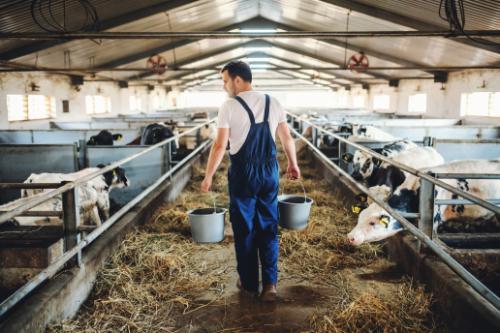
Farmers are coming under increasing pressure as policymakers look to agriculture as a way of addressing climate change and biodiversity loss.
With funding from the 2024-25 AberCollab programme, this research project set out to better understand the place of farmers in the policymaking process.
It also wanted to assess the extent to which farmers are recognised as valuable knowledge holders and contributors to successful policy outcomes.
Roundtable discussions
The project held a series of focused roundtable discussions with local farmers, policymakers and land use scientists to gather their views and understandings of the climate policymaking process, and the place and value of the agricultural community within this process.
The fourth and final session brought representatives of each of these groups together to discuss key findings as well as to identify potential methods for building future collaboration, scaling up this pilot study and devising more inclusive climate policymaking models.
Interdisciplinary project
This was an interdisciplinary project co-led by Dr Hannah Hughes at the University’s Department of International Politics and Professor Mariecia Fraser, Head of IBERS’ Pwllpeiran Upland Research Centre.
Dr Hannah Hughes said: “This AberCollab project allowed us to initiate a conversation on interdisciplinary methods and approaches that can bridge and facilitate collaboration between science, farming practice and national and international climate policymaking. Critically, the project allowed us to initiate relationship building with the local farming community – to hear their views and perspectives and to share with them the views and perspectives of climate scientists and policymakers.”
Professor Mariecia Fraser added: “Our study revealed a perceived lack of trust and communication between the different groups as well as a lack of transparency around how policy is devised and the evidence base that supports it. Through forging these collaborations, we hope to have highlighted the importance of including farmers at an early stage in successful policymaking and the wealth of knowledge they hold about the land and nature.”
The research team are now planning to scale up the project to enable them to identify and examine new models of co-creating climate policy with a range of communities where climate mitigation and adaptation necessitate changed ways of organising and conducting their lives and livelihoods.
Managing invasive mitten crab populations through European collaboration
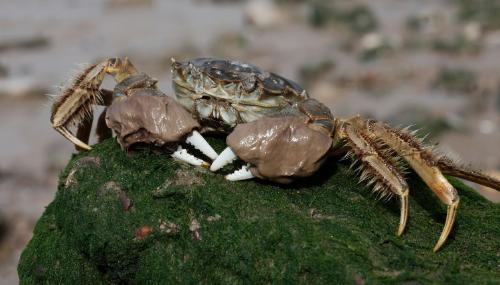
Rising numbers of non-native Chinese mitten crabs are causing problems in the waterways of Wales and other parts of the UK.
Listed as one of the world’s worst 100 invasive invertebrate species, the Chinese mitten crab is belived to have been carried to Europe in the ballast water of ships.
Its burrowing activity can damage riverbanks, while its impact on aquatic biodiversity threatens native species and fishing stocks.
Dr Joe Ironside from the Department of Life Sciences at Aberystwyth University has been working with PhD student Oscar Norton Jones to explore ways of monitoring and managing this invasive species.
With funding from the AberCollab programme, both researchers travelled to Dresden in Germany to present their work at the annual conference of the Coastal Land and Sea Management for Climate Adaptations and Resilience in the North Sea Region (CLANCY), which is funded by the EU’s North Sea Interreg programme.
Dr Joe Ironside said: “Following Brexit, UK institutions cannot obtain funds from North Sea Interreg or become full partners on North Sea Interreg projects, but the CLANCY partners recognised that our work on non-native Chinese mitten crabs was complementary to theirs and invited us to attend their annual conference.
“Our research focuses on the genetics of mitten crab and how we can better detect their presence through using environmental DNA (eDNA) and refuge traps. We have also drawn up rapid site assessment criteria for the deployment of fixed traps.
“We were able to present our findings to an audience which included delegates from Flanders Environment Agency, Province of East-Flanders and University of Antwerp (Belgium), Cellule de Suivi du Littoral Normand (CSLN) and Groupe d’Etude des MilieuxEstuariens et Littoraux (GEMEL) (France), Technische Universität Dresden (TUD), Kiel University and Alfred Wegener Institute (Germany), University of Skövde (Sweden).”
The Dresden meeting also included a visit to a fixed mitten crab trap on the Elbe River, which allowed the Aberystwyth scientists to compare the German design with their own prototype.
As a result of the conference, Dr Ironside and his PhD researcher are now collaborating with Dr Sonja Leidenberger (University of Skövde) on the use of eDNA to detect low-density mitten crab populations, and with Dr Christine Ewers (Kiel University) on population genetics of mitten crabs in Europe.
Oscar Norton Jones added: “We were able to contribute to CLANCY’s decision tree for management of mitten crabs and there has been a lot of interest in using our designs for refuge traps as a means of detecting and sampling adult and juvenile mitten crabs across Europe, which we hope will lead to a further collaborative project.
“We’re now associate members of the CLANCY project, able to attend their monthly online meetings and access the project’s online resources. This ongoing exchange of knowledge and expertise will be invaluable to our research here as well as our EU partners as we seek to stem the damage being caused by this invasive species.”
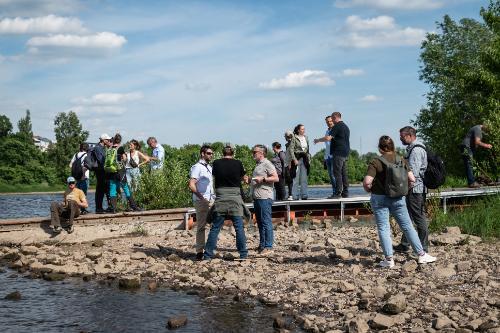
Collaborative Zine Creation: A Creative Research Project on Economic Regeneration and Community Development

From a growing shift to online shopping and out-of-town developments to rising costs and reduced consumer spending, town centre businesses are facing a range of social and economic challenges.
It’s an issue which is the focus of a collaborative research project being piloted by the Aberystwyth Business School.
With funding from our AberCollab 2024-25 programme, Dr Lyndon Murphy is using creative zine-making an innovative way of exploring and understanding economic regeneration and community development in the towns of Aberystwyth in Ceredigion and Mürzzuschlag in Austria.
Both places are facing similar challenges and staff from the business schools at Aberystwyth University and the University of Applied Sciences Wiener Neustadt in Austria are working together to help find solutions.
In May 2025, two workshops were held simultaneously – one at Aberystwyth University with business owners, university staff and other members of the local community, and another in Mürzzuschlag with a similar group of people.
Participants created zines based on their experiences, values and visions for the future of their communities and both workshops concluded with a structured discussion exploring interpretations of Aberystwyth and Mürzzuschlag’s past, present and future economic development and community development questions.
Dr Murphy explained: “By creating the zines as cultural texts, we are able to analyse how business owners and managers, local authority officers and residents perceive their area’s socio-economic realities, values and challenges. The workshops served as a springboard for a creative dialogue which continues to develop.
“The use of zines to creatively analyse and evaluate economic regeneration is a comparatively new research method which facilitates participation and helps surface conversations which may not emerge from traditional interview led research methods or focus groups. This innovative approach has provided new insights into the economic regeneration and community development in Aberystwyth and Mürzzuschlag alongside more traditional analytical frameworks.”
Next steps
The project findings are being shared with Ceredigion County Council and the Mürzzuschlag Gemeinderat municipal authority in Austria.
A new community group has also been set up in Mürzzuschlag following the zine-making workshop to continue conversations around the town’s economic regeneration.
Collaboration continues too between Aberystwyth Business School and the Business School in the University of Applied Sciences Wiener Neustadt, with a formal partnership being established between the two institutions.
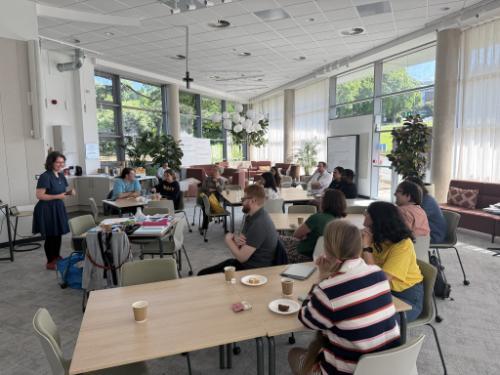
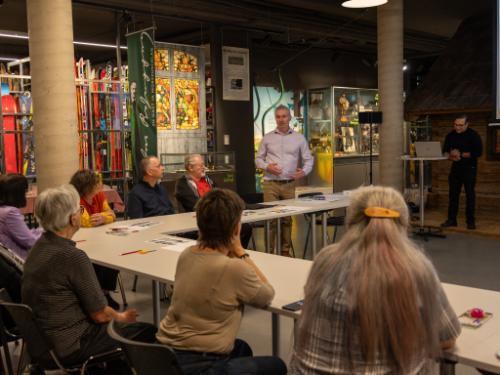
AberCollab 2023-24
AberCollab Report 2023-24
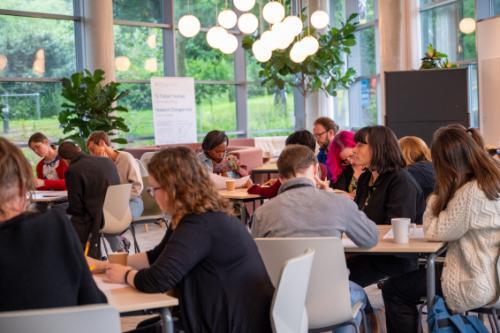
Fostering collaborations between academics, businesses, policy makers and other sectors is key to our mission as a Dialogue Centre.
We do it because we know that working collaboratively can strengthen research outcomes, promote valuable knowledge exchange and make a positive difference to society.
To support the creation of better collaborations and knowledge exchange opportunities, we launched a new funding and training pilot programme on 1 March 2024 called AberCollab.
The initiative offered support for workshops and networking events which facilitated collaboration between the University’s researchers and external partners and helped progress research of benefit to the wider public.
AberCollab was open to researchers from all disciplines and included required training in leading collaborative workshops as well as support for holding a research event or project involving external partners and communities.
A total of 13 projects were funded from departments across the University’s faculties. These varied collaborations brought researchers and stakeholders together to:
- discuss barriers faced by marginalised writers and ways of diversifying participation in writing and publishing
- share knowledge and expertise on dealing with the invasive seaweed Undaria
- consider ways of improving the transition of pupils from primary to secondary school
- develop strategies for using creative writing to improve patients’ experience of fertility treatment, pregnancy and birth
- advance understanding and enable greater collaboration on applying intersectionality in Equality, Diversity and Inclusion policy practice
- maintain and develop new links with industry in the field of nanoelectronics and emerging next generation microchip technology
- exchange knowledge between academics and practitioners on alternative, compassionate approaches to health, weight, and wellbeing
- inform policy and promote a better understanding of current trends in the holiday-let and tourism economy in West Wales
- explore the priorities and concerns of refugee communities in Wales
- scale up an active European research project on glacial degradation and climate change
- look at using computational methods to prevent atrial fibrillation, which causes an irregular and often abnormally fast heart rate
- strengthen engagement with local authorities on transport and health related issues.
Dr Jennifer Wolowic, Principal Lead of the Dialogue Centre, said: “AberCollab has been a great example of how dialogue and engagement with others can contribute to all stages of the research process – from idea generation and emerging projects to research programme expansion and uptake.
“The feedback from our first round of AberCollab funding has been extremely positive. Researchers have told us they found the process energising and that it has led to new connections and stronger ongoing relationships. Several will lead to future funding applications and all have helped clarify potential for future collaborations. I look forward to seeing how our researchers pursue next steps.”
AberCollab was developed as part of Aberystwyth University’s 2023-2028 Innovation and Knowledge Exchange Strategy, which receives funding from the Research Wales Innovation Fund.
AberCollab Case Studies 2023-24
Searching for solutions for next-generation tech

As our electronic devices become ever more sophisticated, silicon integrated circuit chips are required to increase their functionality while continually decreasing in size.
In the search for new technologies to meet the demands of next generation devices, scientists at Aberystwyth University are exploring an emerging field of research known as area selective deposition (ASD). ASD allows for nanoscale patterning of materials replacing the use of traditional photolithographic and etch steps which can be time-consuming, expensive and wasteful of materials.
Dr Anita Brady-Boyd from Aberystwyth’s Department of Physics received support through the AberCollab programme to strengthen collaboration with Imec, a world-leading independent nanoelectronics research and development hub based in Belgium.
“My current research focuses on area selective deposition as a means of bottom-up nanofabrication for next generation electronic devices. It is an exciting but relatively new field of research which could lead to a major shift in how devices are fabricated. Through our AberCollab project, we wanted to share with industry the particular surface science expertise we have at Aberystwyth and to explain the different characterisation and measurements we can offer as well as explore how we can work together to provide possible solutions. We already had links with Imec, a world leader in semiconductor and nanoelectronics, and AberCollab has enabled us to strengthen this collaboration as well as pursue other research goals.”
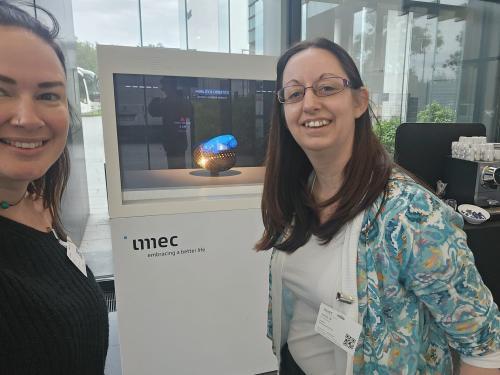
Giving a voice to marginalised writers

A Marginalised Writers’ Takeover Day was held in July 2024, bringing together writers, publishers, charities and activists from across Wales to discuss barriers to participation in writing and publishing and to create new connections.
During the day, a variety of panels discussed ideas around identity, gender, race, exclusion, mental and physical health and creativity. Key speakers included writer and editor Durre Shawar; Gwyllion Magazine; Richard Davies, publishing director of Parthian Books, and artist and writer Joshua Jones. There was an open mic session in the evening which featured the work of over 20 established and emerging writers.
Organised by the University’s Centre for Creativity and Wellbeing with funding from the Dialogue Centre’s AberCollab programme, the event attracted additional funding from Literature Wales as well as sponsorship from Parthian Books and Inclusive Journalism Cymru. Forty people attended in person, with around ten participants joining online.
Dr Jacqueline Yallop, a Reader in Creative Writing and Director of the Aberystwyth University Research Centre for Creativity and Wellbeing, said: “The event proved hugely successful in bringing people together and getting them talking. Immediate feedback suggested the format had worked well and that participants are keen to build on the day.
“There was clear enthusiasm for a vibrant network of this kind that brings writers and publishers together across Wales to share experiences and opportunities, and begins to break down systemic barriers. As organisers, we are gathering more extensive feedback and looking at ways to establish a sustainable network, with the University’s Centre for Creativity and Wellbeing acting as a hub for knowledge exchange and activities.”
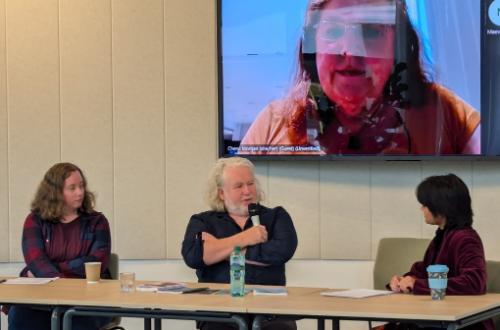
Tourism and the post-pandemic holiday let economy

With restrictions on travelling abroad, the Covid-19 pandemic led to an increase in demand for holiday lets in the UK. It’s a trend which has continued and researchers from Aberystwyth Business School of Business were keen to look in more detail at the relationship between this rise in holiday letting and the tourism economy in West and North Wales.
Their main objective was to gauge the size of the holiday let economy in Ceredigion, Gwynedd and Pembrokeshire and to assess its wider impact. As part of their project, researchers carried out interviews with staff working in tourism organisations, attractions and businesses. They also brought representatives of the tourism industry together in Aberystwyth in June 2024 for a special knowledge exchange event, where they presented and discussed their findings.
Dr Maria Plotnikova, a lecturer in Economics at Aberystwyth Business School, said: “During the event, the group shared the emerging issues that holiday let businesses and attractions are facing. These include the increase in occupancy rate to be eligible for domestic rates, public perception of holiday lets, and coordination and cooperation between the attractions to improve the tourism experience for visitors.”
Dr Mandy Talbot, a lecturer at Aberystwyth Business School, added: “The outcome of this collaborative activity has been the co-creation of new knowledge and a shared understanding of the issues the businesses face. Our findings will help tourism stakeholders understand current trends and the challenges and opportunities facing businesses in a rapidly changing environment. We will also present a report based on our findings to Welsh Government and other decision makers to help inform policy and regulation.”
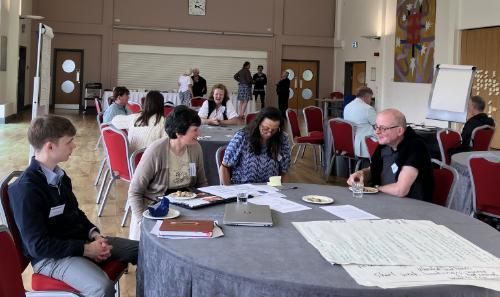
Bringing the body into policy

Discussions about the impact of obesity on the UK’s health and economy can lead to shaming and stigmatising overweight individuals, portraying them as a drain on public services, according to researchers. Furthermore, they say standard measurements of health such as BMI embed racism and ableism in health and reinforce inequalities.
As part of their AberCollab project, researchers at Aberystwyth University sought to critically engage with health policy and propose an alternative and more holistic vision for the health and wellbeing of people in Wales using the principles of the Wellbeing of Future Generations Act.
The Act proposes a ‘compassionate’ approach to health and wellbeing that facilitates an understanding of mental wellbeing and encourages physical activity. However, it does not include detailed and specific actions, beyond a focus on BMI, particularly in relation to weight and health. Researchers aimed therefore to develop a practice-led project which sought to inform future policy development, exploring alternative approaches to food, nutrition, body-size and health, informed by different approaches to nutrition and body image. A one-day workshop was held with speakers from a range of disciplines, including critical dietetics, health sociology, critical disability studies and human geography.
Dr Emma Sheppard, a Lecturer in Sociology in the Department of Geography and Earth Sciences at Aberystwyth, said: “Our workshop focused on identifying commonalities in our own approaches to conceptualising health and wellbeing, before focusing on the ethics of carrying out research that could contribute to health policy. Because our speakers represented such a range of disciplines, it was helpful to see how conversations around weight in healthcare encounters emerge and intersect so much with class, race, gender, disability and age.”
Dr Elizabeth Gagen, Senior Lecturer in Human Geography at Aberystwyth University, said: “We discussed a pilot research project and identified two particular approaches which we are now considering in more depth. One of these projects would centre on the Wellbeing of Future Generations Act and would involve conducting research into the factors that encourage people to flourish, within and beyond traditional models such as the social determinants of health. The project outcomes would reconceptualise the indicators currently used to measure health and wellbeing in the Wellbeing Act. We believe implementing different measures would improve the care people receive by foregrounding dignity, respect and trauma-informed approaches to health and wellbeing.”
